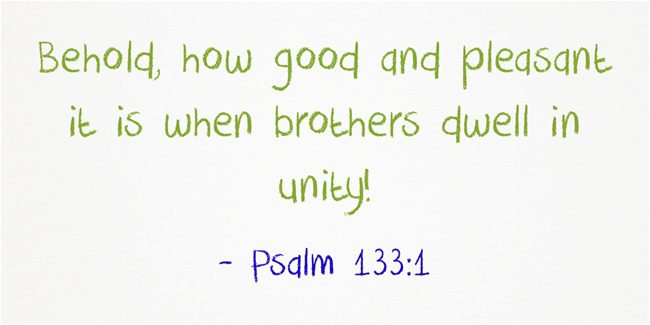Here is a Sunday school lesson or Bible study about unity from the Bible.
Unity of the Spirit
Ephesians 4:1-3 “I therefore, a prisoner for the Lord, urge you to walk in a manner worthy of the calling to which you have been called, with all humility and gentleness, with patience, bearing with one another in love, eager to maintain the unity of the Spirit in the bond of peace.”
The Apostle Paul considered himself a slave or prisoner of the Lord and as such, He walked worthily in humility and gentleness and so He admonishes the church to do the very same thing and that looks like this; we walk with all humility, in patience, gentleness, and above all, bearing with one another (putting up with one another) in love. If we are not walking in humility then God is opposed to us (James 4:6). This is the walk “to which you [and I] have been called.”
Why is the expression “walk” used in Ephesians 4:1 with regards to our calling?
Do we have to “maintain the unity of the Spirit?”
Are we “eager” to maintain this unity of the Spirit?
What is “the bond of peace?”
Unity of the Mind
First Peter 3:8 “Finally, all of you, have unity of mind, sympathy, brotherly love, a tender heart, and a humble mind.”
When the Apostle Peter wrote “finally” it’s like he is saying, “Here’s my point” and so he tells the church there must be unity of mind just as the Body of Christ, the church, has unity in its members. If there is no unity in the members of Christ’s body, then how can there be unity in being Jesus’ hands, His ears, His eyes, His mind, His feet, and His voice? If the eye argues with the hand that it would be a better hand, how can there be unity? No, the members should “Do nothing from selfish ambition or conceit, but in humility count others more significant than yourselves” (Phil 2:3) which means we “look not only to his own interests, but also to the interests of others” (Phil 2:4). When our hearts are tender and our minds are humble we can show sympathy, like that of a brother or sister who genuinely loves. Love creates unity. Even though Jesus is God He “emptied himself, by taking the form of a servant, being born in the likeness of men. And being found in human form, he humbled himself by becoming obedient to the point of death, even death on a cross” (Phil 2:7-8).
What does it mean Jesus “emptied Himself?”
Did Jesus give up some of His rights?
What does unity of mind look like in a Sunday school class or Bible study?
The Unity of the Church
Psalm 133:1 “Behold, how good and pleasant it is when brothers dwell in unity!”
This is one of the most popular Bible verses there are. Maybe it’s because we value unity in the church. Even the world craves unity as there is significant effort under way for a unified world government but the unity in the church is diametrically opposed to the unity of the world. For one thing, “you are not of the world, but I chose you out of the world, therefore the world hates you” (John 15:19b). We don’t hate those in the world but love them, pray for them, and do good to those who do bad things to us (Luke 6:27-33) so we must “not love the world or the things in the world. If anyone loves the world, the love of the Father is not in him” (1st John 2:15). The world will not love us back to be sure but neither did we love God first (1st John 4:19). This is why unity is so important; we are swimming upstream against the culture and against our own nature. Unity starts with “U and I,” in that order.
Does Jesus statement that the gates of hell won’t prevail against the church give you peace of mind?
Is there are greater need for unity in the church today? If so, why?
How did the apostles react to severe persecution (Acts 5:40-41)?
How should we react to severe persecution (Matt 5:43-48)?
The Unity of the Faith
Ephesians 4:11-13 “And he gave the apostles, the prophets, the evangelists, the shepherds and teachers, to equip the saints for the work of ministry, for building up the body of Christ, until we all attain to the unity of the faith and of the knowledge of the Son of God, to mature manhood, to the measure of the stature of the fullness of Christ.”
The early church had unity and God gave the increase to those who were saved and on one occasion, “about three thousand souls” (Acts 2:41) were saved so what did the early church do? In Acts 2:42 it says they “devoted themselves to the apostles’ teaching and the fellowship, to the breaking of bread and the prayers” and for us, the apostles’ doctrine is the New Testament, so they studied the Scriptures and they broke bread or had the Lord’s Supper or Communion, apparently on a consistent basis according to church historians. They also had regular fellowship and prayers, so the early church studied the Scriptures, had fellowship, partook of the Lord’s Supper, and they prayed. These four essentials help the early church “attain to the unity of the faith” through “the knowledge of the Son of God” in order to reach “mature manhood” and the measure of that is the perfect stature of Jesus Christ.
Do all members contribute to “the unity of the faith” and if so, in what ways?
How can “we all attain to the unity of the faith?”
Who is it that placed these members in the body of Christ?
Conclusion
I urge you in your study to look at all of the Bible verses and read them aloud in the class so that you can get the most out of this lesson on unity because If we are of one mind, then we will “Do nothing from selfish ambition or conceit, but in humility count others more significant than yourselves” (Phil 2:3) and that means we will be “submitting to one another out of reverence for Christ” (Eph 5:21). Paul writes in Philippians 2:1-2; “So if there is any encouragement in Christ, any comfort from love, any participation in the Spirit, any affection and sympathy, complete my joy by being of the same mind, having the same love, being in full accord and of one mind.” There is both joy and a blessing in unity as the psalmist reminds us again, “Behold, how good and pleasant it is when brothers dwell in unity” (Psalm 133:1).
Do you feel joy when you count others more significant than yourself?
Why does unity bring joy?
What has changed in your understanding about unity in this study?
Article by Jack Wellman
Jack Wellman is Pastor of the Mulvane Brethren Church in Mulvane Kansas. Jack is also the Senior Writer at What Christians Want To Know whose mission is to equip, encourage, and energize Christians and to address questions about the believer’s daily walk with God and the Bible. You can follow Jack on Google Plus or check out his book Teaching Children the Gospel available on Amazon.
















